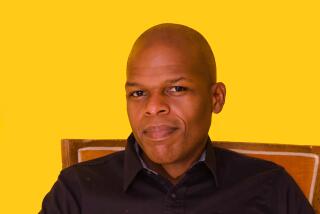So Why Do I Still Feel Like a Slave?
- Share via
Recently I contacted a white colleague to set up a cross-cultural event for our two congregations to view and discuss the movie “Amistad.” While we were planning the event, I decided to see the movie for myself. I experienced the movie on a visceral level, clearly the director’s intention. But what Steven Spielberg could not have anticipated was the profound feeling of familiarity that I, a person of near African descent (for indeed all humanity ultimately is of African descent), would experience while viewing this film. I had mixed emotions after the viewing. One thing, however, was perfectly clear: The last thing I wanted to do was to sit in a room with a bunch of white people and talk about my feelings.
The irony of the situation was enhanced by the fact that I had looked forward to celebrating the “Amistad” event as part of the rich heritage of social justice of my church, the United Church of Christ (formerly the Congregational Church). I knew the story of the Amistad as the seminal event in the Congregational Church’s commitment to people of African descent, a commitment that continued after the abolition of slavery in the form of academies, schools and colleges to educate the freed slaves. A foundation (the American Missionary Assn.) and six historically black colleges and universities from that period continue to benefit black people in this country.
For days after seeing the movie, I still was trying to put into words what I felt. Finally, it came to me in the form of a question: So why do I still feel like a slave? If these liberating events happened more than 100 years ago, why do I still feel like a slave? If good people of European descent prevailed over the wicked purveyors of human flesh, slavery, misery and death, why do I still feel like a slave? If Cinque and the others were judged to be born free as Africans and not “born slaves, as on a plantation,” why do I still feel like a slave?
Then it hit me. Those haunting words, first laid out in the movie as a legal strategy to set Cinque free, were the very words that had condemned subsequent generations of us Africans to the same slavery that he would escape.
Why is this so? Why is Cinque’s victory not also my victory? Because I was born on a plantation, a plantation called America. Yes, the Civil War was fought and won to preserve the Union and set the slaves free. Yes, the Constitution has been amended to stipulate my rights as a full citizen. Yes, these things are all true.
But it is also true that while the names of the institutions of oppression have been changed to protect the guilty, the reality of that oppression continued from the Amistad event for another 125 years, through the civil rights movement and continues on in various forms today. It also is true that the reparations that were approved by the government to those direct victims of slavery never were delivered. So those whose names had been changed from their true African names to those of their European owners often found themselves living on the same “plantation” on which they were born and doing the same jobs at which they had previously toiled and for not much more pay. While no one may have called them slaves, I’m sure their question then is my question today. So why do I still feel like a slave?
I still feel like a slave every time a white person presumes that the best thing I can do is serve or entertain him or her. I feel like a slave every time any of my people are refused service at a Denny’s, stopped without probable cause by police, followed by store security, not hired, denied housing or killed by some skinhead because of the color of their skin. I feel like a slave every time I hear my name and know it is not my own.
I still feel like a slave when I face the reality that even the descendants of those noble New England Congregationalists who fought with faith and substance to send Cinque back to Africa would not today consider me eligible to be the pastor of one of their still substantially segregated churches.
But I take heart in the story of “Amistad.” I will not stop struggling for the freedom of my people. I will not give up on finding honorable allies of European descent. I will not stop encouraging people of near African descent to be better than we have been. And in spite of it all, I will follow Cinque’s advice to his colleagues in chains: “Keep your head up.”
More to Read
Only good movies
Get the Indie Focus newsletter, Mark Olsen's weekly guide to the world of cinema.
You may occasionally receive promotional content from the Los Angeles Times.










